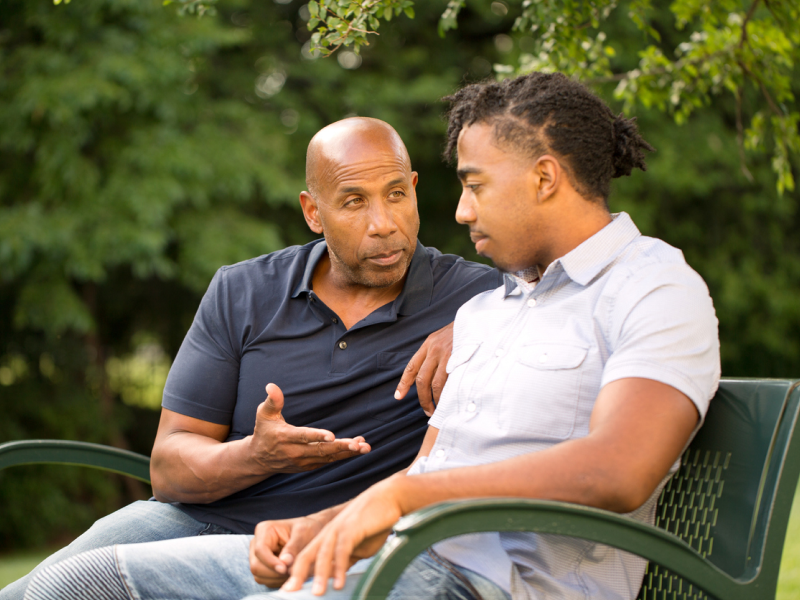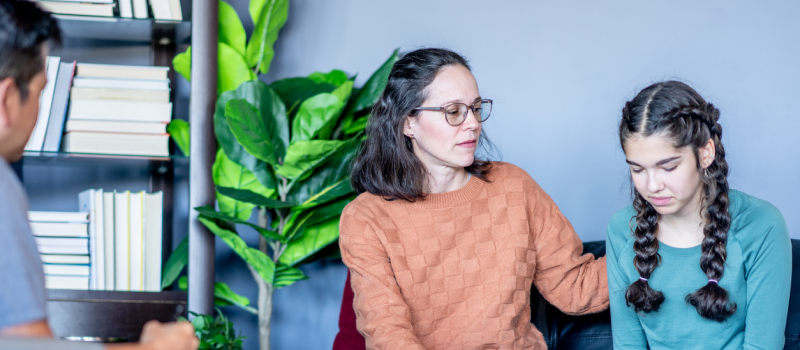
Table of Contents
Yes, Enmeshment Can Cause Trauma—Here’s How to Heal

Written By: Alex Bachert, MPH

Clinically Reviewed By: Dr. Don Gasparini
April 30, 2024
5 min.
Discover more about enmeshment trauma so that you can break unhealthy relationship patterns, set personal boundaries, and improve your self-esteem.
Learn more about our Clinical Review Process
Table of Contents
In many cases, having a close relationship with your family is considered ideal. Being part of a close-knit, emotionally healthy family where people understand the importance of open communication is shown to offer security, support, and a sense of belonging.
But what if your family is so close that it seems a little unhealthy? A lack of privacy, boundaries, and independence can all be signs of something called enmeshment — a term first introduced by family therapist Salvador Minuchin to describe relationships that struggle to balance autonomy and connection. Enmeshment typically refers to family relationships, but it can also occur in romantic partnerships.
Enmeshment can result in identity confusion and emotional dependency, also known as enmeshment trauma. Below, we delve into the signs of enmeshment trauma and offer tips for healing from this kind of childhood trauma.

Healing from childhood trauma is possible
Virtual intensive therapy with other people who get it.
What is childhood enmeshment trauma?
Enmeshed relationships lack healthy, clearly defined interpersonal boundaries. In an enmeshed family, parents or caregivers often expose their children to emotions and situations that aren’t appropriate for their age or depend on their children for emotional support. As a result of enmeshment, a child grows up with poorly defined boundaries and a lack of emotional independence.
For some people, the experience of being part of an enmeshed family can lead to a type of trauma called enmeshment trauma. “Enmeshment trauma is a type of childhood emotional trauma that involves the disregard for personal boundaries and loss of autonomy between individuals,” said Na’Keora Bryant, MSCP, a Charlie Health Group Facilitator.
With enmeshment trauma, people are unable to focus on their personal needs, growth, and goals. Over time, this type of behavior can have long-term effects, including relationship problems, low self-esteem, and mental health symptoms like anxiety and depression.

Signs of enmeshment trauma
Learning how to recognize the potential signs of enmeshment trauma can help people address problematic behaviors and set better emotional boundaries. According to Bryant, not having alone time and feeling anxious when not connected or near another person can both be signs of enmeshment. Here are some other common emotional and behavioral signs of enmeshment trauma.
- Low-self esteem
- Emotional dysregulation
- Lack of boundaries
- Conflict avoidance
- Codependent relationships
- Lack of independence outside of your enmeshed relationship
- Fear of abandonment
Also, you can spot enmeshment by the behavior of those around you. If a parent, close family member, or caregiver exhibits the following signs it may indicate an enmeshed relationship:
- They don’t offer you privacy or space
- They frequently vent about trouble at work
- They put their own emotional needs before yours
- They overshare details of their romantic relationships
- They are jealous of your friends and life outside of the home
- They don’t respect your personal boundaries
What causes enmeshment trauma?
Enmeshment trauma can be caused by multiple factors, including dysfunctional family dynamics and intergenerational behavior patterns. “Enmeshment in families can be caused by dysfunction and abuse within the family. For example, a single mother lives through her child thereby making the child feel smothered,” said Bryant.
Enmeshment often involves family issues, such as an illness or major life change. For example, having a parent who suffers from mental illness or addiction can lead to poor boundaries because the child may feel responsible for their parents’ needs. Enmeshment is also seen in divorce, with one or both parents oversharing their personal issues and relying on their child for emotional support.
Enmeshment trauma is also linked to parenting issues like emotional incest. “In an emotionally incestuous relationship, the caregiver’s needs must always come first. If the child attempts to do anything that detracts from that, it places them in a very uncomfortable position, and the parent often makes the child feel guilty,” according to Kathleen Douglass, MA, LCPC, a Primary Therapist at Charlie Health.
5 tips for how to heal from enmeshment trauma
Similar to other forms of emotional trauma, overcoming enmeshment trauma requires a commitment to personal growth and healing. Having access to the right resources and support can help you break unhealthy habits, better understand your own emotions and needs, and improve your self-esteem. Here are five tips for healing enmeshment trauma.
1. Set clear personal boundaries
Limited physical and emotional boundaries are a leading characteristic of enmeshment. When families lack healthy boundaries, or parents are overly reliant on their children, it can be hard for people to prioritize their own needs. Take some time to reflect on your needs and how you plan to communicate them to your family. When setting personal boundaries, try to remain calm, clear, and firm.
2. Make time for self-care
When you’re in a codependent relationship, it can be easy to forget about your own desires and needs. That’s where self-care can help. Make time for activities that bring you joy, help you relax, and connect you with people who respect and support your needs. This is also an opportunity to set personal goals for your mental well-being.
3. Get to know yourself
Enmeshment trauma can make it difficult to develop a strong sense of self so take some to learn what makes you. Gaining a better understanding of who you are, what matters to you, and what you’d like to do in life is all part of the healing process. Start small, like deciding how you’d like to spend the weekend, then continue to make decisions that reflect your values, goals, and best interests.

4. Be patient
If you grew up in an enmeshed household, change won’t happen overnight. Remember to be patient and show yourself compassion as you create space to change your thought and behavior patterns.
5. Get professional help
Healing from enmeshment trauma often involves talk therapy such as cognitive behavioral therapy (CBT), dialectical behavioral therapy (DBT), and family system therapy. Many people may also benefit from specialized trauma therapy, such as eye movement desensitization and reprocessing (EMDR), which can help with processing trauma from emotional abuse.
How Charlie Health can help
If you struggle with trauma or are unable to develop healthy and meaningful relationships, Charlie Health is here to help. Charlie Health’s virtual Intensive Outpatient Program (IOP) provides more than once-weekly mental health treatment for teens and young adults dealing with complex mental health conditions, including issues related to enmeshment trauma.
Our clinicians use a variety of evidence-based therapy modalities in individual therapy, group sessions, and family therapy. You will also connect with peers who deal with similar struggles to help you remember that you are not alone. Fill out the form below or give us a call to start your healing journey today.




